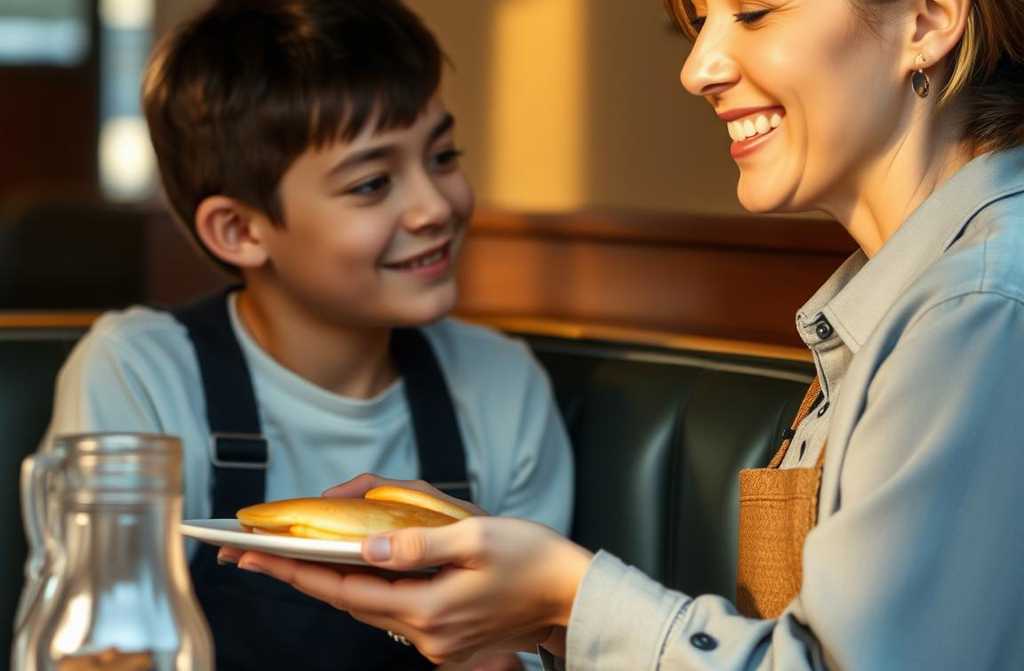The waitress who secretly fed a lonely boy every morning, until one day four black Land Rovers pulled up outside the diner, and soldiers stepped inside with a letter that silenced the entire town.
The Daily Life of Emily
Emily Whitmore was twenty-nine years old and worked as a waitress at the Rose & Crown, a small eatery tucked between a hardware shop and a laundrette in the quiet countryside of Devon.
Her days followed the same rhythm: waking before dawn, walking three streets to the café, tying a faded blue apron around her waist, and greeting the regulars with a smile.
No one knew that behind her smile lay a quiet loneliness.
She rented a tiny one-room flat above the local chemist. Her parents had died when she was a girl, and the aunt who raised her had long since moved to Cornwall.
Apart from the occasional holiday phone call, Emily was mostly alone.
The Boy in the Corner
One Tuesday morning in October, Emily noticed him for the first timea small boy, no more than ten years old.
He always sat in the farthest booth, as far from the door as possible, with a book spread open before him and a rucksack too big for his slight frame.
That first morning, he ordered only a glass of water. Emily brought it with a smile and a paper straw. He nodded without looking up. The second morning was the same.
By the end of the week, Emily realised he arrived every day at exactly 7:15, stayed forty minutes, then left for schoolwithout eating a thing.
On the fifteenth day, Emily set a plate of toast and jam before him, as if by accident.
“Sorry,” she said casually. “The kitchen made too much. Better you have it than we toss it away.”
The boy looked up, hunger and wariness in his eyes. Emily simply walked away. Ten minutes later, the plate was empty.
“Thank you,” he whispered when she returned.
It became their unspoken ritual. Sometimes toast, sometimes eggs and beans, or porridge on chilly mornings. He never asked, never explainedbut he always ate every bite.
Quiet Questions and Unwelcome Remarks
“Whos that boy youre always feeding?” asked George, the retired postman, one morning. “Never seen his parents.”
“I dont know,” Emily admitted gently. “But hes hungry.”
The cook, Maggie, warned her: “Youre feeding a stray cat. Give too much, and theyll never leave. One day, hell vanish.”
Emily only shrugged. “Its all right. I remember being hungry.”
She never asked his name. The careful way he sat, the watchful look in his eyes, told her questions might scare him away.
Instead, she just made sure his glass stayed full and his food warm. Over time, he seemed less tense, and sometimes their eyes met for a second longer.
But others noticed too. Some made cruel remarks:
“Playing charity on company time now?”
“Kids these days expect handouts.”
“In my day, no one got anything for free.”
Emily stayed silent. She had long learned that defending kindness to bitter hearts rarely changed a thing.
Paying Herself
One morning, the manager, Richard, called her into his office.
“Ive seen you with that boy,” he said sternly. “We cant be giving away free meals. Bad for business.”
“I pay for them,” Emily replied at once.
“With your tips? They barely cover your rent.”
“Its my choice,” she said firmly.
Richard studied her for a long moment, then sighed. “Fine. But if it ever affects your work, it stops.”
From then on, Emily paid for the boys breakfasts from her own wages.
The Empty Booth
But one Thursday, the boy didnt come. Emily kept glancing at the door, a tightness in her chest. Still, she set a plate of toast at his usual spot. He never appeared.
The next day, the same. Then a week. Then two. By the third week, Emily felt a hollowness she couldnt explain. She didnt even know his name, yet his absence made the café feel emptier.
Someone posted a photo of the empty booth online, mocking: “The Rose & Crown now serves invisible children.” The comments were worse.
Doubt
Some called it a stunt; others said shed been played. For the first time, Emily wondered if shed been naive.
That evening, she opened an old box of keepsakes from her father, who had served as an army medic. She reread the diary entry she already knew by heart:
“Today, I shared half my rations with a boy. Risky, maybe, but hungers the same everywhere. No one grows poor by sharing bread.”
Her fathers words reminded herkindness without conditions is never wasted.
Four Land Rovers at the Rose & Crown
On the twenty-third day of the boys absence, something happened.
At 9:17 a.m., four black Land Rovers with government plates pulled into the car park. The café fell silent.
Men in uniform stepped out with disciplined precision. From the first vehicle emerged a tall man in full dress uniform, officers flanking him.
“How can I help you?” Richard asked nervously.
“Were looking for a woman named Emily,” the officer said, removing his cap.
“Im Emily,” she answered, setting down the coffeepot.
“My name is Colonel James Whitmore, Royal Army Special Forces.” He drew an envelope from his pocket. “Im here because of a promise I made to one of my men.”
He paused, then added:
“The boy youve been feeding is named Thomas Wright. His father was Sergeant Daniel Wright, one of the finest soldiers under my command.”
Emily exhaled.
“Is Thomas all right?”
“Hes safe now, with his grandparents,” the colonel assured her. “But for months, he came here every morning while his father was deployed.”
Sergeant Wright never knew his wife had left, and Thomas had been surviving alone. Too proud, too scared to tell anyone.
The colonels voice softened. “Sergeant Wright was killed in action two months ago. In his last letter, he wrote: *If anything happens to me, please thank the woman at the café who fed my son without asking questions. She didnt just feed a child. She gave a soldiers son his dignity.*”
Emilys hands trembled as she took the letter, tears streaming down her cheeks.
The colonel saluted, and every soldier followed. The customers stood in silent respect. Emilythe quiet waitress who had lived unseen for so longnow stood at the centre of their honour.
A Changed Community
The story spread quickly. The same people who had mocked her now praised her. The Rose & Crown hung a flag and a plaque by Thomass booth: *Reserved for those who serveand the families who wait.*
Veterans and military families began visiting, leaving notes and donations. Tips became generous, often with messages: *Thank you for reminding us what truly matters.*
Later, Emily received a letter, written in careful handwriting:
*Dear Miss Emily,
I didnt know your name until that day. But every morning, you were the only one who looked at me like I wasnt invisible. Dad always said heroes wear uniforms.
But I think sometimes they wear aprons too. Thank you for taking care of me when I couldnt explain why I was alone. I miss Dad.
And sometimes, I miss your toast.
Your friend,
Thomas Wright*
Emily framed the letter and tucked it behind the counter.
The Legacy of a Simple Act
Months passed, but the story didnt fade. The café started a fund for soldiers families. Richard, once skeptical, surprised her by matching donations from his own pocket.
One morning, Emily found a challenge coin on her counter, engraved: *Semper MemorAlways Remember.*
Later, Richard hung a new sign in the window:
*Whoever you are. However much you can pay. No one leaves here hungry.*
Emily smiled, pocketing the coin as she walked home. She thought of Thomas, now living with his grandparents, and hoped he carried the same lesson: even in the hardest times, kindness exists.
Not every act of care is remembered, but every one matters.







